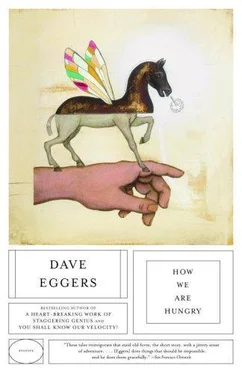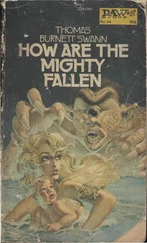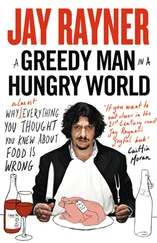Dave Eggers - How We Are Hungry
Здесь есть возможность читать онлайн «Dave Eggers - How We Are Hungry» весь текст электронной книги совершенно бесплатно (целиком полную версию без сокращений). В некоторых случаях можно слушать аудио, скачать через торрент в формате fb2 и присутствует краткое содержание. Год выпуска: 2005, Издательство: Vintage Canada, Жанр: Современная проза, на английском языке. Описание произведения, (предисловие) а так же отзывы посетителей доступны на портале библиотеки ЛибКат.
- Название:How We Are Hungry
- Автор:
- Издательство:Vintage Canada
- Жанр:
- Год:2005
- ISBN:нет данных
- Рейтинг книги:3 / 5. Голосов: 1
-
Избранное:Добавить в избранное
- Отзывы:
-
Ваша оценка:
- 60
- 1
- 2
- 3
- 4
- 5
How We Are Hungry: краткое содержание, описание и аннотация
Предлагаем к чтению аннотацию, описание, краткое содержание или предисловие (зависит от того, что написал сам автор книги «How We Are Hungry»). Если вы не нашли необходимую информацию о книге — напишите в комментариях, мы постараемся отыскать её.
A Heartbreaking Work of Staggering Genius
How We Are Hungry — читать онлайн бесплатно полную книгу (весь текст) целиком
Ниже представлен текст книги, разбитый по страницам. Система сохранения места последней прочитанной страницы, позволяет с удобством читать онлайн бесплатно книгу «How We Are Hungry», без необходимости каждый раз заново искать на чём Вы остановились. Поставьте закладку, и сможете в любой момент перейти на страницу, на которой закончили чтение.
Интервал:
Закладка:
I woke up to coughing. Erin stumbled into the bathroom to do it but that only made it louder, slapping against the tiled walls. The sun was just coming up. She blew her nose. I opened the sliding doors in time to catch her emerging from the bathroom, naked below her small T-shirt. With the bathroom door open, she was backlit in gold. She turned the light off and was black again.
“Sorry,” she said. “Go back to sleep.”
I squinted at her. Her legs were thinner than I’d expected, softer. I thought of white glue.
“I feel like hell.”
I was thrilled. God had acted quickly. Erin was transformed: yesterday strong and quick-moving, now frail and sour. She threw back a shot of Nyquil and passed out.
I slid the doors and slept until nine. I wanted to be gone, but I worried about what the hotel staff would think of me leaving my one-armed friend alone, sick, while I flitted about the island. I left and told the man at the desk that Erin was resting, not to disturb her.
It was mid-afternoon and wet but my head was clear. It was more difficult to be angry at Erin while she was asleep and I was driving, away and alone. I was at Kyleakin, the tiny town of intersection with mainland Scotland, and stopped before the bridge ready to take me back over. I could leave her. I had a change of clean clothes in the car. A small group of buildings to the right, a small castle’s ruins just beyond.
I stopped at a hostel. Everyone in the common room was young and pretending to be poor except, to the left, in the cafeteria, a family of five, Russian, eating spaghetti while assembling a jigsaw puzzle.
At the counter, I asked about a boat.
“We have one rowboat.”
The boat, laying on the gray shore of rocks and sticks, everywhere black seaweed like the hair of a hundred dead mermaids, was overturned and silver. I untied the knot, righted it and dragged it to the water. I pushed it in and jumped from a rock, trying to keep my feet dry. The water here would be brutal. The tip of my right foot came into the boat wet, but otherwise I had done it. I was in the boat and it was moving from the shore. I was shooting out into the bay in this borrowed boat and I was alone and could be going anywhere.
But the boat was facing the wrong way. All I could see was the shrinking of that beach and those buildings. For a rowboat passenger all was adventure, facing forward, but for the rower it was work, the shoveling of coal in the furnace-room. I rowed until the hostel was vague and the castle ruins were a smudge. The water was smooth and the rowing easy. I was heading into the ocean.
I’d never owned a boat but now felt I’d wasted so many years. I laughed and laughed at the simplicity of it all, this boat, this water. I couldn’t believe how stupid it was. I could pinch all this between my thumb and forefinger.
I rowed for twenty minutes and then heard barking. I looked to the shore, for a dog running along the beach. But I saw no dogs. I turned around and found myself fifty feet from a pair of rock islands breaking the water’s surface, parallel, black, each the size of a bus. One was barren, but the one beyond it, about a hundred feet farther, was being busily evacuated by at least forty seals, platoons of seals, all barking and flopping and diving to get away from something. But what?
Oh.
I turned the boat and rowed away from the rocks; I felt terrible for upsetting them. I rowed quickly so they would return. I was halfway back to the shore when they began jumping back aboard their rock.
I turned the boat around again, heading back toward the seals. I wanted to see them, had to. This time I stayed low, rowing slowly, almost imperceptibly turning my head periodically to check my direction and the state of the seals. The seals were not acting in a uniform way. They wrestled. They barked, they leapt on each other. Some would dive into the water and others would appear, shooting from the ocean as if falling from holes in the sky. It annoyed me, exasperated me, all their movements, without sense, all their bumping into each other, their flesh rubbing and undulating, all their noise. I expected these animals to be orderly. Their bodies were sensical, their cells and veins were mathematical. Was not everything, on a cellular level, well-maintained, logical and unimproveable, like a honeycomb? At some point, though, up the developmental ladder the order is lost and there is this, the bouncing and barking, everything foul.
And my feet were wet. My ankles were wet. I looked down. The boat was sinking. It was only a few inches above the water, which was plowing cheerfully through a hole under my seat. I tried to row but the boat was done for, immovable. The hole was enormous.
To shore it was five hundred yards at least. I’d freeze before I made it. I realized with clarity that I might die here, and could think only of what the three of them would do the weekend of my funeral, reunited again. I left my pants and shoes and belt in the boat and jumped before I could guess at the shock to my chest. My arms flailed but soon found a rhythm and I swam for shore, the car keys in my mouth, the sun now gone and the wind coming in. I swam with a necessary fury. I swallowed the coldest water.
On the beach I rose and felt huge. The Russian children from the hostel saw me emerge and ran back inside. The world had tried to kill me but there were explosions within my chest and I’d won. I had reached shore and would soon be inside the car, heat heaving. I would change clothes and be new.
Driving back to the hotel I knew that Erin was just a human in this world — her foibles weren’t worth being angry about. She couldn’t control herself if she wanted to, and all I could do, as someone who was capable of survival in any circumstances, was to have charity for Erin. Like a rat, she would mate with whomever or whatever she shared a cage. I had no anger anymore. I wanted to embrace her, to forgive her, to stroke her like a pet.
I came home to Erin and wanted to celebrate. I entered her room as she was waking up and slithering to the bathroom to vomit. I watched her lower her head below the toilet’s rim, heard the sound of water being poured into water. I needed contact. I wanted her to see me alive. I wanted to eat her vomit — anything to put my mouth on hers.
“You awake?” I asked.
She was kneeling in front of the toilet.
“Not for long. Can you excuse me for a second?” she said, closing the door slowly.
“Sorry,” I said, and went back to my own room.
I watched Sky News at the bar and drank two drinks I’d never had before, both with whisky, which I’d always loathed but now felt was the only appropriate drink for someone like myself, someone who could save his own life. It was late in the afternoon when I checked on Erin again, sliding the doors and finding her dressed and looking almost normal.
“You’re up.”
“I am. I feel good.”
“I just heard you in the bathroom.”
“Yeah, but that was the last one. I’m empty. I feel good. I want to drive somewhere,” she said.
We drove.
We had the windows open and everything smelled wet, every blade of grass promising blooms. The roadsides were fenced and the sheep stayed clear. We got out three or four times by the coast, walking on wet brown paths to look down to the gray sea far below, past the hillside sheep and small white homes.
The rain came. The wind was strong and the air was scratched in straight lines, sky to earth. We got out once, at Moonen Bay, to walk on the shore of a small beach of large round stones, and were soaked in minutes. She spoke.
“Thanks for being good, Tom.”
I nodded. I shook, drenched. She knew nothing.
As the day went dark we found ourselves near the top of the island. I was driving and Erin was looking at the map. She had found a lighthouse she wanted to see before it got too dark.
Читать дальшеИнтервал:
Закладка:
Похожие книги на «How We Are Hungry»
Представляем Вашему вниманию похожие книги на «How We Are Hungry» списком для выбора. Мы отобрали схожую по названию и смыслу литературу в надежде предоставить читателям больше вариантов отыскать новые, интересные, ещё непрочитанные произведения.
Обсуждение, отзывы о книге «How We Are Hungry» и просто собственные мнения читателей. Оставьте ваши комментарии, напишите, что Вы думаете о произведении, его смысле или главных героях. Укажите что конкретно понравилось, а что нет, и почему Вы так считаете.












